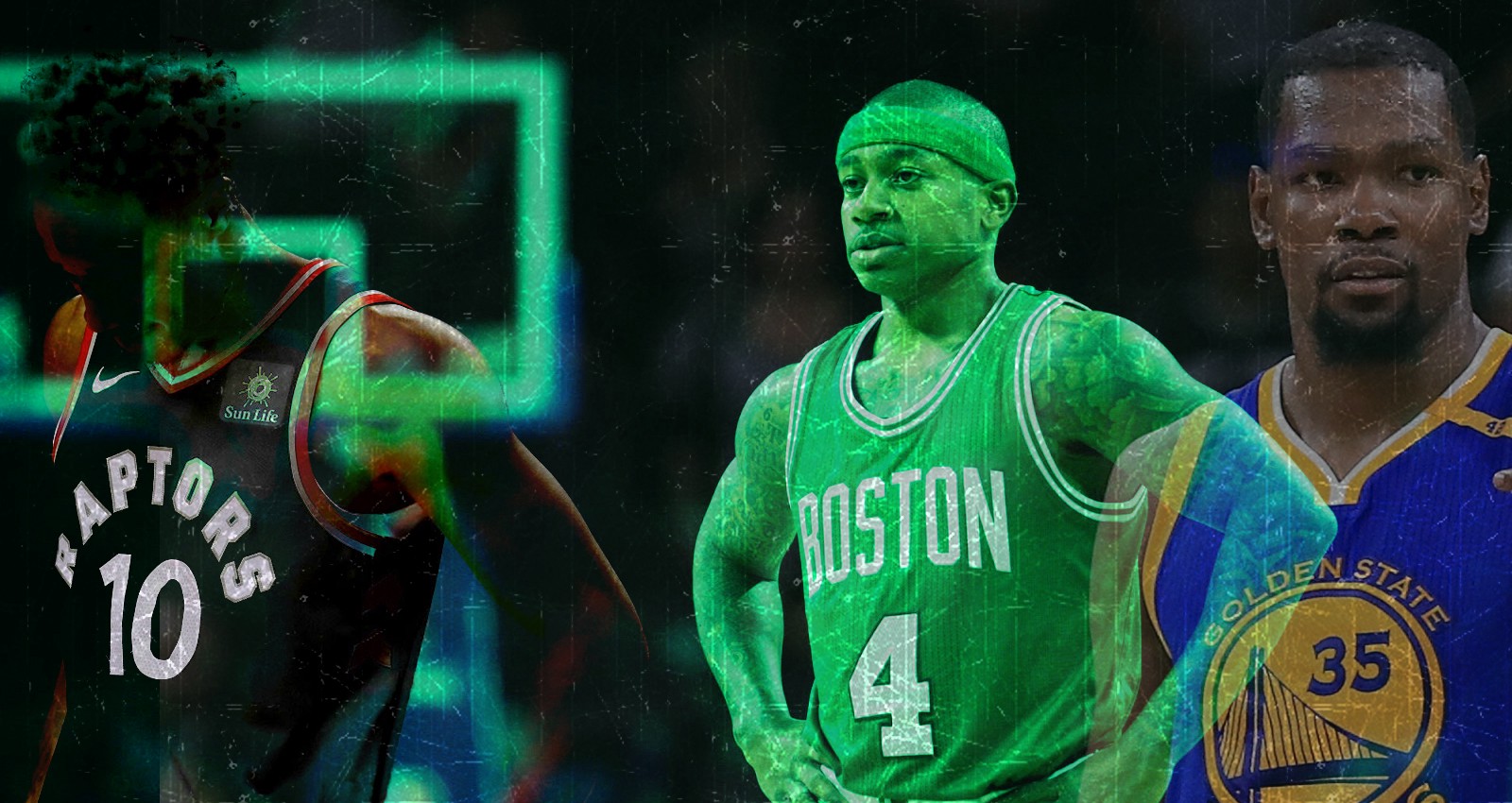The Myth of Loyalty in the NBA
The panel looks at the double standard between “player loyalty” and “team loyalty” in today’s game.

The concept of “player loyalty” has always been a hot-button issue in the NBA. We’ve seen many players like Kevin Durant, LeBron James and Gordon Hayward criticized for abandoning the teams they began their careers with, while teams that trade away fan favorites get away with the “The NBA is just a business” excuse. What accounts for this double standard, and should the idea of “loyalty” in the NBA be retired altogether?
serge, GrandStand Central Staff Writer
The older CBA agreements were inherently structured to give teams more power in retaining the talent at hand, giving players less agency and putting teams in the power position when it comes to negotiations. We still see remnants of this today, such as through allowing the current team to offer a better max deal or even re-sign players over cap with the Bird rule. It’s only recently that we’re seeing players exercise the power they have to make their own moves. This definitely created patterns that, at least until now, helped establish an illusion of loyalty.
Now that players have diversified streams of income and more flexibility when switching teams and negotiating contracts (1+1 structure pioneered by LeBron), the playing field is leveling. Think about it this way: most of our parents have stayed with one company from day one. They got in, received permanent employment and rose through the ranks. Were they loyal? Probably to the paycheck. Now, the world of work is changing, and here I am writing an article while mailing out five invoices for a freelance business that I have during my lunch break on my contract job. It’s the same with the NBA.
Player loyalty is an overrated aspect that doesn’t even come into play. So much of player movement is tied to money, exposure and success that loyalty is a hollow term. What’s the incentive to be loyal to an organization that will trade you or try to undersell you and basically power plays you into staying because of the CBA structure? I never get mad when players leave without a second thought because teams will always treat them like assets over actual human capital. There’s one thing in loyalty about equal footing, and there’s another thing about “sticking around for convenience,” and we have been mistaking the latter for the former way too much lately. So yeah, I think every player should go ahead and secure the bag in whichever way they want. Because loyalty in sports is a made-up concept.
Because one day you ask a player to be loyal to the team and bleed green and play for you a day after his sister died, and the next you’re on Twitter firing off hot-takes when that player gets traded.
Brandon Anderson, GrandStand Central Staff Writer
There is no loyalty in sports. There never was. Loyalty is just a concept we made up to shift blame and give ourselves something to yell about. Nobody is loyal in sports, and nobody needs to be — not players, not teams, and not fans either.
Ask Kevin Durant about loyalty. Ask him what it was like to play his first season in front of raucous Seattle SuperSonics fans, only to see the team uprooted and stolen overnight, moved to the center of the country, abandoning a franchise that had been loyal for decades. Ask him how much anyone even thought about how the players had to move too, how they had to leave behind families, homes and friends. Then talk to him about when he fought and fought and finally broke through to make the NBA Finals… only to face a superteam constructed by LeBron James, who abandoned his hometown squad to team up with his buddies and chase a ring.
Gordon Hayward? He left to play with the one coach in the country who believed in him and recruited him out of high school. Isaiah Thomas? He played through broken teeth, a broken body, and a broken heart when his sister passed away, for love of the Boston Celtics. They traded him a couple of months later, and now he’s playing for the minimum. DeMar DeRozan? He chose loyalty, picking Toronto over a chance with his hometown Lakers, and look at what that did for him now.
Why should the front office be loyal? Loyalty is what turns the Los Angeles Lakers into the Los Angeles Kobes the last few seasons of a $25-million-a-year contract no one thought was a good idea. Loyalty is driving the San Antonio Spurs slowly into NBA purgatory as they pay each of their veterans 30 percent too much for a season too long, pledging an oath to team culture and the throne of Pop. Front offices have one job: win. And guess what happens if they don’t do enough of that? They get fired, too. You do your job, or you risk getting replaced by the next guy.
Fans have some nerve to complain about loyalty on either end, when those same fans turn on a player or a franchise in an instant. Fans are loyal as long as it suits them. As long as the player is an outstanding citizen who stays on the team, sacrifices money and wins a lot, we’re loyal. But we reserve the right to change our mind at any point. That’s not loyalty. Maybe we’re our own double standard.
There’s a bigger, deeper problem behind all of this. We’re taking 19-year-old young men and “drafting” them, sending them off to Salt Lake, Oklahoma and Cleveland and telling them they’ll play ball there, and they’ll play for that owner and with those teammates and on that contract, and they’ll like it. And then we expect them to stay there and remain happy and loyal.
Then, let’s think of the racial component. How many of these men are black, and how many are playing for their families or to escape another life their friends back home are still living? And we are taking those men and telling them they must work for an owner that drafted them, and we expect loyalty? You can go ahead and connect the dots on that one.
There is no such thing as loyalty in sports. There never was. Players, teams, and fans are loyal to one thing and one thing only — themselves. And maybe it’s time we honestly acknowledge that.
Jackson Frank, Senior Sports Editor at The Gonzaga Bulletin, Contributor at BBALLBREAKDOWN and Liberty Ballers
I’ll open this by answering the final question here: yes, the concept of loyalty should be retired. Player autonomy is good for the league and ensures that teams aren’t given an overdose of power to wield. Player and team loyalty aren’t dead, but the idea that either side owes something to the other is. Loyalty between both parties should be the exception, not the standard.
As for the “perceived double standard,” that stems from franchises ultimately holding much of the power. They are the ones with the money controlling the fate of these players’ livelihoods. No matter how talented a player is, he cannot make a living in the league without a team choosing to employ him. So, when teams decide to uproot a player’s life and ship them to an unfamiliar or non-ideal destination, loyalty — or the lack thereof — becomes the buzzword thrown around. When a player decides to bolt from their current team, they are complicit in the decision to forego comfort and stability; when a team makes the decision, the player has no say, which angers fans.
It’s an easy cop-out answer, but the NBA — and every professional sports league for that matter — is a business. Sometimes, loyalty has to be thrown out the window when executing cost-effective or franchise-altering deals. Regarding the two deals that have thrust team loyalty into the spotlight — Boston trading Isaiah Thomas and Toronto trading DeMar DeRozan — both teams appear to be better off following those transactions. In a perfect world, those trades don’t happen, but a perfect world doesn’t exist, and neither should the mandate for loyalty in sports.
Nicholas LeTourneau, Video Coordinator at NetsDaily and WNBAInsidr
Loyalty is overrated from both a player and player perspective. When talking about players leaving in free agency, the fans are usually the most upset because they have an emotional attachment to the players. They bought the merchandise, they spent their hard-earned money on the tickets, they put in the investment. Unless you’re Dan Gilbert during the decision, ownership rarely makes a public show about a player leaving. Players leave for a multitude of reasons, and usually people twist it into something deeply personal when really the player is just trying to make their money or do what they feel is best for them. Like anyone in their current field who got a job offer from the top company in their line of work wouldn’t accept a job offer that would lead to more advancements or a higher salary. It is a horrible double standard.
On the flip side, when ownership trades a player who has continually re-signed, it is ownership that isn’t loyal or trying to punish the player. The perfect example is DeMar DeRozen getting traded from Toronto. General Manager Masai Ujiri gave the core players several chances to make something happen, and after the same result year after year, he ended up firing Coach of the Year Dwane Casey and trading DeRozan for one of the top players in the league (when healthy) in Kawhi Leonard. DeRozan was very upset, but at the end of the day, he was the most tradable asset, and it was time for a change. Toronto swung for the fences.
The Brooklyn Nets did something similar by trading all-time leading scorer Brook Lopez for D’Angelo Russell. Lopez knew he was the most tradable asset, and after the deal went down with Los Angeles, he understood that it was the only move to make. Fans often overrate loyalty because that is the currency they have paid for their fandom. They are loyal, so they expect the same from the players they root for and the executives that run their teams. At the end of the day, both players and teams will do what is best for them — every single time.
William Lou, Writer at theScore and Raptors Republic
The only people that need to be loyal in professional sports are the fans. Anything beyond that is either marketing or naive, and that goes for both players and teams. This is an entertainment product for fans to invest their time and emotion into, as a distraction from real life. Fans can express their fandom however they see fit, but that love goes one way. Teams have a responsibility to field the best players possible (and the salary cap means it’s imperative to find the best players at the lowest salary), while players have their own interests to look out for. Neither side is looking to prioritize the fans in the same way the fans are prioritizing the sport, so there’s always going to be a disconnect.
What makes this dynamic especially complicated is that it serves nobody — not the fans, players, nor teams — to conduct themselves as if it were only a business, because it detracts from the experience of fandom. That contributes to the backlash that players and teams receive when they split, because it’s easier to be distracted by the concept of loyalty than to face the reality that professional sports only exists to serve the meaning that we choose to give it. Most rational people can step back and understand the decisions that players and teams make, but the whole point of fandom is to be irrational. That’s not to say every situation is fair — the Raptors could have kept DeMar DeRozan in the loop about trade talks, for example — but those aren’t questions of loyalty, so much as courtesy.
As for the double standard, fans generally have more mutual interest with a team than they do with players; therefore, the players have it worse when they split. It’s not entirely fair, but that’s what the money is for.

Sandy Mui is the Facilitator of Special Projects at GrandStand Central. She takes pride in her background as a multi-platform journalist and more recently, as a digital campaigner advocating for gun safety in the United States. You can follow her on Twitter here.

After LeBron lost yet another Finals appearance, the Kobe vs. LeBron debate resurfaced. So, let's let the streets be…grandstandcentral.com

